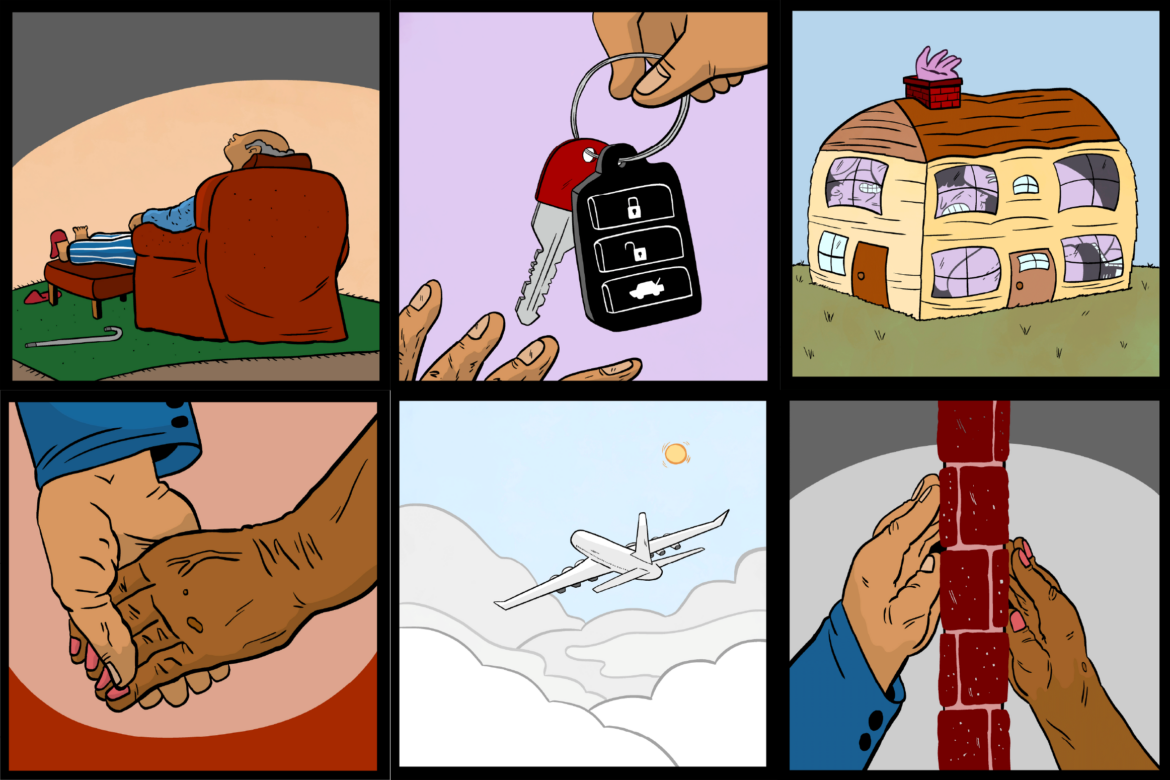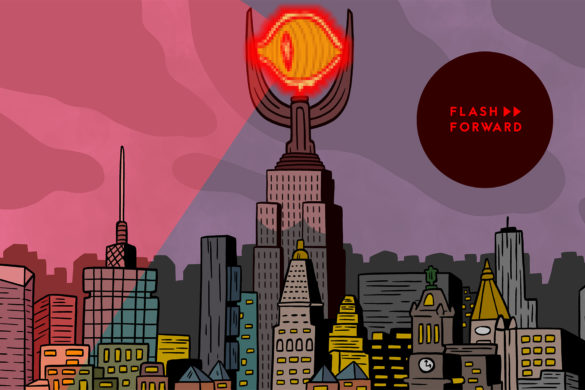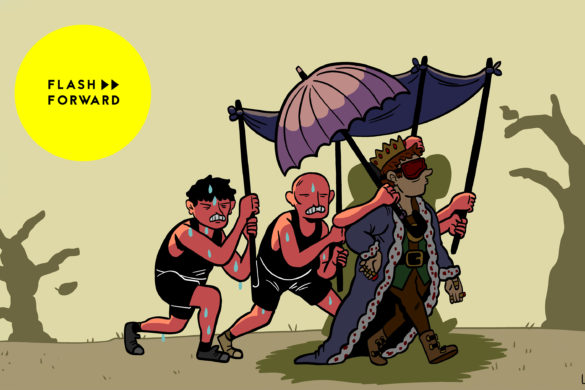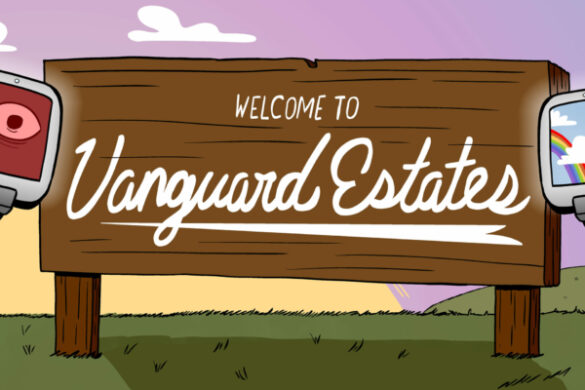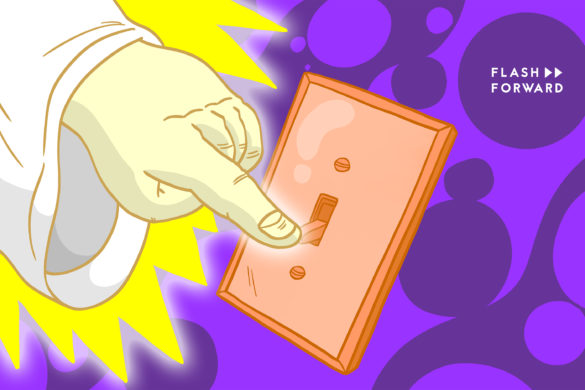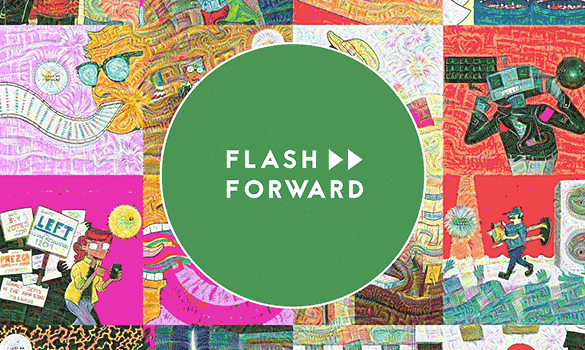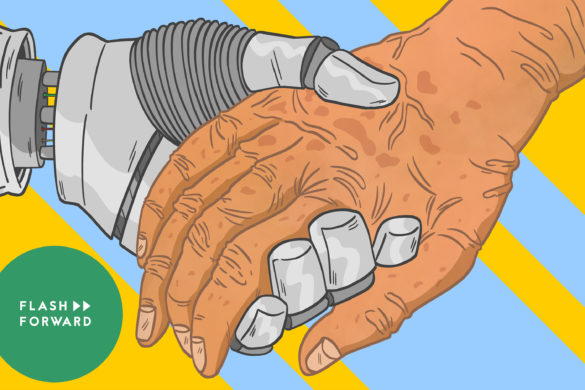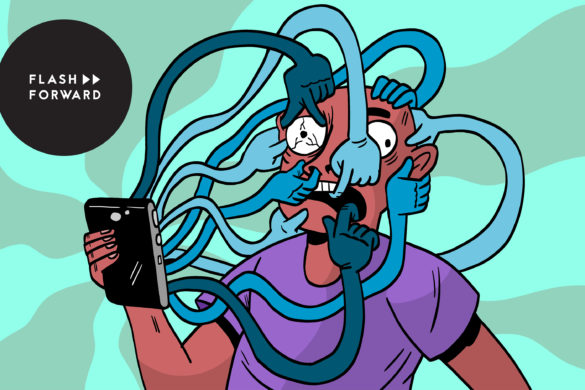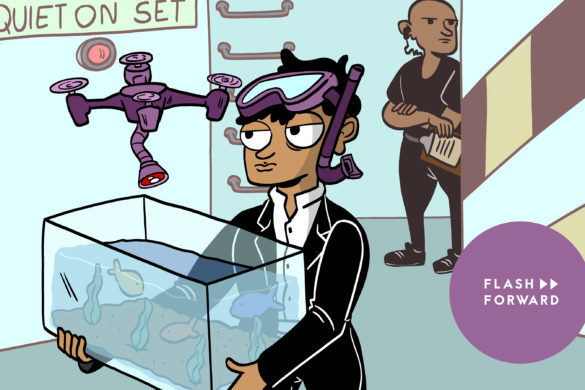In this series, we’re taking a look at some of the real science, policy, economics, law and ethics that inspired the events of Vanguard Estates. Today: what it’s really like living with dementia, and caring for someone who has it?
Remember, listen to Welcome to Vanguard Estates first!
Guests:
- Kate Swaffer: activist & author, co-founder of Dementia Alliance International
- Nikki: care partner & founder of A Log Cabin in Brooklyn
Further Reading:
- What The Hell Happened to My Brain?: Living Beyond Dementia.
- Love, life, loss : a roller coaster of poetry. Volume 2, Days with dementia
- Diagnosed with Alzheimer’s or another dementia
- More than half of nurses ‘too busy’ to provide the best patient care
- Dementia Alliance International
- Boléro: ‘Beautiful symptom of a terrible disease’
- Unravelling Boléro: progressive aphasia, transmodal creativity and the right posterior neocortex
- I’ve heard that sundowning may happen with dementia. What is sundowning and how is it treated?
- Alzheimer’s: Managing sleep problems
- Dementia, Alzheimer’s and Eyesight: Symptoms and How to Help
- Caregiver Burnout
- Caregivers dying before care recipients with dementia
- Caregiver Statistics: Health, Technology, and Caregiving Resources
Episode Sponsors:
- Shaker and Spoon — A subscription cocktail service that helps you learn how to make hand-crafted cocktails right at home. Get $20 off your first box at shakerandspoon.com/flashforward.
Flash Forward is hosted by Rose Eveleth and produced by Ozzy Llinas Goodman. The intro music is by Asura and the outro music is by Hussalonia. The episode art is by Mattie Lubchansky. Amanda McLoughlin and Multitude Productions handle our ad sales. This is a companion episode to the Vanguard Estates series, which you can hear in the Flash Forward feed.
That’s all for this future, come back next time and we’ll travel to a new one.
FULL TRANSCRIPT BELOW
▹▹ ▹▹ ▹▹ ▹▹ ▹▹ ▹▹ ▹▹ ▹▹ ▹▹ ▹▹ ▹▹ ▹▹ ▹▹ ▹▹ ▹▹ ▹▹ ▹▹ ▹▹ ▹▹ ▹▹ ▹▹ ▹▹ ▹▹
FLASH FORWARD
Vanguard Estates: “Living With Dementia”
[Flash Forward intro music – “Whispering Through” by Asura, an electronic, rhythm-heavy piece]
ROSE EVELETH:
Hello and welcome to Flash Forward. I’m Rose, and I’m your host.
This is the first of five episodes in which we are going to cover the real science, tech, policy, ethics, and economics, etc. that inspired the “Welcome to Vanguard Estates” series. These episodes are going to talk all about the various storylines, which means that if you have not heard them all and you don’t want to be spoiled, you’re going to want to wait to listen through everything first and then come back to these.
Before we talk about the details of the story, I want to say a couple things about the story itself and the narrator perspective you heard. One thing that sometimes surprises me when I release Flash Forward episodes is that people who listen to the show sometimes assume that the fictional elements at the top are always positive, in the sense that I’m always describing how I think things should be or the choices that people should make. That is not true. (laughs) In the story, our narrator is presented with a bunch of choices, many of which kind of suck. And the narrator is not always in the right, right? Their point of view on things is not mine and it isn’t the one that I think everybody necessarily should have. The idea of the story is to, kind of, show you a few ways of seeing things, and see how those ways feel when you’re, sort of, forced to live with them and make choices inside that framing.
So, one example of this is that, in the story, the dad character doesn’t actually have a ton of agency, right? The narrator and their sister make a lot of choices for him and he doesn’t really get to be in charge of his life. And while I would certainly not argue that that is good, and right, and how I think it should be, I do think that that it is, unfortunately, realistic.
KATE SWAFFER:
We’re just sufferers and we’re expected to go home and accept that the end is near, and that… You know, there’s a gross underestimation of the capacity of all people with dementia, and I’ve been saying that for a very long time.
ROSE:
This is Kate Swaffer, an activist who advocates for the rights of people like her, people living with dementia. When she was 49 years old, Kate was diagnosed young with a relatively rare form of dementia called semantic variant primary progressive aphasia.
KATE:
I was a married, working mother of two teenage boys and also studying, part-time, a double degree just for fun.
ROSE:
A few years earlier, she had had brain surgery, and as part of her recovery, she saw a neurologist regularly.
KATE:
So at one of my, just, regular checkups with the neurologist, I said to him, “You know, I’ve got these strange things happening with my, you know, capacity.” I didn’t call it capacity back then but, you know, changes in my ability to spell and even finding my way around campus was getting a little bit difficult.
ROSE:
When the neurologist suggested memory testing, at first Kate kind of deferred.
KATE:
I didn’t know that people my age or younger, much younger, could get dementia. So I didn’t have any testing for another year or so.
ROSE:
But eventually, the issues were bad enough that she went in for the tests.
KATE:
I started the process of testing and was initially told I was just below average for my age, which I found particularly challenging because I had had a very high IQ. So, to be a bit below average for my age was, for me, devastating; for the doctor, he didn’t see it as particularly unusual. But things change quite rapidly, and within another 12 or 18 months I was diagnosed with a rare semantic variant of primary progressive aphasia.
ROSE:
We’re going to talk a little bit about the different types of dementia and the ways that it gets diagnosed, next week. But Kate says that once she had her diagnosis, she was surprised by her options. Or really, the lack thereof.
KATE:
We’re not actually told to live well when we’re diagnosed. The predominant message is to… if you’re working, younger, to give up work. And in my case, I lost my job. So, nobody told me that dementia caused disabilities. The medical community still see dementia as a death sentence. They have a fatalistic, therapeutic, nihilistic approach to dementia and mostly don’t yet even recommend rehabilitation. If I’d had a stroke, aged 49, I knew exactly what would have happened and how I would have been supported by the healthcare system.
ROSE:
But that’s not what happens to people with dementia, Kate says. People with dementia are diagnosed and basically told to go home, and get their affairs in order, and wait it out until the end.
KATE:
That is so wrong that we do that to people with dementia. And you know, I’ve been quoted as having said for years: dementia is the only condition I know of, as a retired health care professional, where you’re not told to fight for your life. You’re just told to go home and die. And I refuse to accept the negative, tragic narrative of dementia because that is disrespectful, and demeaning, and causes people to give up. It causes people to lose hope.
ROSE:
Kate can speak to that from personal experience.
KATE:
I cried for weeks. You know, I thought that what everyone was telling me was going to be true; my life was over. And back at that time, arthritis hadn’t entered my world quite so much, and I was a runner, and I just used to run, and run, and run, and run until the tears moved from being stressed about having dementia to stress from running. You know, the pain from… you know, you get to that pain level, and the endorphins kick in, and the pain goes away.
ROSE:
In doing research for this episode, I found a lot of resources, and studies, and support groups, and forums for those caring for people with dementia. And that’s great, and we’re going to talk about that side of things in a minute. It’s very important. But I found it really hard to find any support forums, or meetups, or groups, or resources directed at the actual people with dementia themselves. And Kate says that that’s pretty normal.
KATE:
Nobody provides people with dementia with any grief and loss counseling. It’s there for our families, but not for us. And even in 2022, it’s not there for me. I have to go and pay for my counseling if I want loss and grief counseling. But the National Dementia Organization provides it free for carers. How can that be? It’d be like treating the family members of a loved one with cancer and not treating the person with the cancer. Fancy that. We’d all be outraged.
ROSE:
Even some of her friends and family seemed to, kind of, write her off once she told them about her diagnosis. Because of her earlier health issues, Kate had an email list where she kept people up to date about her condition and progress.
KATE:
In fact,I sent an email out to, I don’t know, a couple of hundred people, blind copied, just to let everybody know in one big swoop. And you know, I think I got under five replies.
ROSE (on call):
Really?
KATE:
Yeah.
ROSE:
What did they say?
KATE:
“Thanks for letting me know.” That’s it. So, you know, I had a lot of people basically just disappear from our life for all sorts of reasons, including the stigma of dementia.
ROSE (mono):
And Kate’s experience with dementia actually isn’t just personal. In an earlier part of her life, she was a nurse.
KATE:
The facility I was working in was the first one in South Australia that I know of to develop a dedicated ward or unit for people with dementia, which I guess I thought was an improvement on being shackled to a bed. However, you know, I now see that as just further institutionalization, and worse, segregation.
ROSE:
We are going to come back to this question of nursing homes, and institutionalization, and living conditions in another episode that is all about those things. But Kate says that even back then she noticed the way people with dementia were treated — as if they couldn’t understand anything. She told me the story of one woman she helped care for.
KATE:
The senior staff had said to me, “Don’t waste your time on Mrs. X,” or Ms., actually; she was a Ms. “She’s mute.”
ROSE:
But Kate didn’t listen to them.
KATE:
And so I used to interact with this lady just in the same way that you and I are interacting, as equals. I would talk to her. I would ask her how she was. I would tell her about my day. And then one day… and I suppose I… She always used to have this, sort of, twinkle in her eye, like a sparkle. And a beautifully dressed, wealthy woman. She’d been an international golfer, which was quite rare for women back then. And I used to try really hard to be the nurse that was looking after her when I was on, particularly, morning shifts to do her showering, and toileting and those things. And I was in the washroom with her this day, and I mean, if you’ve interviewed nurses for anything on this program or read the papers about nurses, they’re really busy people.
It’s a very busy, time-consuming job. Anyway, I said to this lady, “Oh, you know, it’s a really busy day today. Could you hurry up and have a wee?” And she looked at me, and she winked, and she said, “Maybe you could have a wee for yourself.” And I said, “Oh, my God. I knew you were in there! Why won’t you talk to anybody?” She said, “Because they all treat me like I’m a moron. And you don’t. And I will talk to you, but only in a locked bathroom or washroom.”
ROSE:
A lot of Kate’s work as an activist tries to push back on this idea that once someone has dementia, they can no longer really participate fully in their own life. Instead, she says that dementia should be treated a lot like other disabilities — something people can adapt to, that can be managed as it progresses.
Kate has all kinds of tips and tricks to help her from day to day.
KATE:
I started to put signs up around the house like, “Do not cook when you’re alone. Turn off the gas.” I’ve nearly burnt the house down two or three times. So, you know, we’ve got some little ways. And there is technology now that can turn the ovens off, turn cookware off at certain times. And things at the door. “Don’t forget your keys. Don’t forget your handbag. Don’t forget this. Don’t forget that.” So, just this list of things.
And because I sometimes my… you know, a lot of things that we all do automatically without thinking about have become harder for me. So, knowing which sequence to get dressed in, what goes on first. Even way back, you know, I opened my wardrobe one day and wondered whose clothes they were. So, I have a bit of a unique sense of humor, so I put a sign in there with an arrow: “These are yours, stupid,” (laughs) with a big smiley face. So, I wasn’t derogatory towards myself. That’s just my sense of humor.
ROSE:
And Kate has family to lean on when she needs them.
KATE:
My husband and my children, when they were living at home – they’re in their 30s now. But when they were living at home, they kept trying to take over. And actually, the sessions that they went to, to learn about having dementia in the family, they were told to take over, basically. That’s the advice that family members get given. “You have to take over. You’ll have to do everything for them.”
ROSE:
If you read about aging, dementia, disability, and caregiving online, you’ll come across a lot of different words for the support network for somebody with some condition, whether it’s dementia or otherwise. People use words like caregiver, carer. Personally, Kate doesn’t like any of those.
KATE:
I don’t like the term caregiver or carer because, to me, it’s like an unequal power balance. Suddenly I’m the receiver of care and somebody else is giving. So it really removes… you know, really a power imbalance immediately happens with that terminology, in my opinion. And my husband hated being referred to as a carer. He said, “I’m your husband. I’ve always cared for you. Why am I suddenly now only the carer?” And so I nicknamed him, way back in 2012, my backup brain.
ROSE:
And that’s kind of the way she likes to think of this more generally, right? As backup. Not the primary brain; the one on the bench, waiting to be needed.
KATE:
Our youngest son said, “That’s the perfect analogy, Mum. So the only time we should step in is if it’s dangerous, without you inviting us to support.” So, I used to have a high level of maths ability and I can’t even use a calculator now. I can argue with myself and fight with myself, and try and use a calculator for 2 hours. Or I can email or ask my husband to do it for me. I used to fight. Like, it’s as much an effort for us to accept support as it is for other people to sit back and not take over, or to accept that we need some support.
ROSE:
When she travels – which is something you heard about in the series – Kate has a whole routine and plan.
KATE:
I travel with one airline because I’ve got disability support set up with them. I travel with one… I try and have accommodation with one particular group of hotels because I’ve got set up some disability support with them. And I think that sort of stuff’s really important because they’re only used to having lifts and ramps. They had not thought of any other disability support. So, you know, for me on my own, I won’t stay in an accommodation that doesn’t have a 24-hour helpdesk, you know, someone downstairs at the desk. Because if I suddenly need help, who am I going to call if I’m away from home?
ROSE:
But Kate also wanted to emphasize that this isn’t all about loss. Kate might not be able to do math the way that she used to, but she says her disease has opened up other parts of her brain.
KATE:
I’ve had… The creative side of my brain has completely changed since dementia. I’ve read a lot of stories of people who’ve suddenly developed a creative side of their brain.
ROSE:
And this isn’t just idle speculation. There are actually neuroscientists who believe that Bolero, the famous piece of music written by French composer Maurice Ravel in 1928, was, in part, the product of the musician’s dementia.
[clip of orchestral performance plays in background]
In a case study published in 2008, neuroscientists documented changes in the brain of a scientist named Anne Adams, who developed dementia and became a painter. In fact, Anne even painted her own interpretation of Bolero before she even knew anything about these theories that Ravel had dementia too. And when Kate read about these cases, she saw herself reflected in them.
KATE:
I suddenly thought, Wow, that’s where all my poetry and other stuff’s come from, because I wasn’t a poet before dementia. So, there’s lots of gifts in dementia.
[orchestral piece continues and begins to fade down]
ROSE:
Now, maybe you know someone who has dementia. Maybe you have helped care for someone as they’ve gone through it, or had a friend, or partner, or neighbor with the disease. And maybe you are thinking, “Okay, this is all well and good, Kate, but clearly, you are not actually that impacted by the disease. Look at you! Doing press! Having this whole conversation! You are not the kind of person with dementia that people are talking about when they talk about institutions and all of that stuff.” And I asked Kate this, because every time I have someone on the show from an impacted community to talk about this kind of thing, I get emails about how they’re clearly not representative of people who really have X, Y, or Z condition or disability.
KATE:
I hear that a lot, and I know I don’t look like dementia, but I don’t look like I need a brain surgery. And most people I know don’t look like they’ve got diabetes. They don’t look like they’ve got heart disease. And unless you’ve lost your hair from cancer treatment, you generally don’t look like you’ve got cancer. So there isn’t a special look or way with dementia. And I think that the world, and particularly the older person’s, you know, psychiatrists and geriatricians, have been so used to only treating people in their 80s and 90s, who are much more advanced in dementia, and don’t seek a diagnosis because of the stigma. The misperception is that most people with dementia are not like me. And when I get to late stage, I’ll be just like everybody thinks a person with dementia should be like.
ROSE:
And while it might sound to you, listening to this, like Kate doesn’t really have any symptoms of dementia, she pointed out that you, and even I, the one talking to her in that moment, can’t actually necessarily tell.
KATE:
For me to be on a podium or for me to do this interview, I’ve had to go through quite a bit of preparation that you can’t see.
ROSE (on call):
Can you talk about some of the preparation for this interview, for example?
KATE:
I can’t speak for people who are non-verbal because I’m not completely non-verbal. But I have moments of being non-verbal now, or I have to use the text-to-speech app. But just to prepare for this type of interview, I really have to research my own life and reread bits of blogs. I’ve got out a number of different articles that I can quickly pull up if you ask me something.
ROSE (mono):
And Kate understands that, at some point, she won’t be able to do these interviews anymore. She probably won’t be able to travel or do some of the other things she likes to do. But that’s true of all of us, right? Whether we have dementia or not. And in the meantime, Kate wants to advocate for a better future for those with dementia.
ROSE (on call):
If you were to, sort of, depict like the best possible future for folks with dementia, like, in your dream world, what is that world like?
KATE:
Wow. In my dream world, people with dementia will automatically be seen to be people living with acquired disabilities. They will be provided with a disability assessment to help them live their lives. I mean, let’s not forget, dementia is a terminal illness, but so is living. So, some people do want to jump on the bucket list. That’s okay. But other people like me would actually like to keep contributing and living their own life. So we have a legal right to be provided with disability assessment and support. So that, in my ideal world, would be embedded in every single care plan, post-diagnostic pathway, everywhere in the world. And we would be provided with really proactive brain-injury-style rehabilitation; speech pathology, exercise, physiology, all those other things that everybody else would get.
ROSE (mono):
The experience Kate described, where she was sent home with a diagnosis and basically told … “Good luck, things are pretty much over for you,” that isn’t just something that happens to the person with dementia. Family members are also basically told the same thing.
KATE:
My husband was told… because they separate us. He was told, “You’ll soon have to give up work to take over everything.”
ROSE:
And when we come back, we’re going to talk about the other side of this coin — the perspective of someone who is the family member helping someone navigate dementia, and what that is sometimes like. How do you help a family member through this with joy, dignity, and care?
NIKKI:
All we were told was that we should be more patient with her as she forgets, and I’ll see you in six months. So now what? Just be patient and she’s fine?
ROSE:
But first, a quick break.
ADVERTISEMENT: SHAKER & SPOON
This ad talks about alcohol. If you don’t want to hear that, skip it.
Flash Forward is supported in part by Shaker & Spoon, a subscription cocktail service that helps you learn how to make hand-crafted cocktails right at home. Every box comes with enough ingredients to make three different cocktail recipes developed by world-class mixologists. All you need to do is buy one bottle of that month’s spirit, and you have all you need to make 12 drinks at home. At just $40-50 a month, plus whatever the cost of the bottle is, this is a super cost-effective way to enjoy craft cocktails in your house. And you can skip or cancel boxes any time.
Invite some friends over, class up your nightcaps, or be the best houseguest of all time with your Shaker & Spoon box. You can get $20 off your first box by going to ShakerAndSpoon.com/FlashForward.
ADVERTISEMENT END
NIKKI:
I was living in a studio apartment with my dog and my cat. So it was a little tight but, you know, very cozy. Thanks, Beyoncé.
ROSE:
This is Nikki. Twelve years ago, she was living in that cozy apartment with her dog and her cat, working her way up the ranks in the fashion industry, when she started noticing that her mom was forgetting things.
NIKKI:
But she was really good at covering herself, because she would be like, “So? Don’t you forget? Don’t you forget things?” “Uh, she’s right.” (laughs) Yeah. And you just made it so, so natural. Like, “Everyone forgets. Just relax.”
ROSE:
At first, Nikki let it go. But then things got worse.
NIKKI:
She was forgetting how to get home from work. And she had been working there for four years. She was also, you know, burning a lot of the food. She was an excellent cook. I am not, so when she burnt food, I kind of had her back like, “I know, right? How do we do this?” But she was also getting into a lot of car accidents and she was starting to be a lot more clumsy with her body and falling a lot like she just couldn’t get her balance.
ROSE:
When Nikki and her sister brought their mom into the neurologist for an evaluation, she watched as her mom, once again, tried to evade the doctor’s questions.
NIKKI:
You know, the doctor would say, “When’s your birthday?” And she would say, “When is yours? I don’t know you.” (laughs) Good answer, I guess, you know? Or “Who’s the president?” And she would be like, “Oh, please let me talk about that guy,” you know? She just had such great answers, but really she could not answer the question.
ROSE:
Pretty quickly, they had a diagnosis. Alzheimer’s. But that was kind of all they really got.
NIKKI:
There was no real plan of action on how to take on living with someone who has dementia. All we were told was that we should be more patient with her as she forgets. And “I’ll see you in six months.” So now what? Just be patient and she’s fine?
ROSE:
And her mom didn’t handle the news well.
NIKKI:
My mom, you know, with this… When she was given this diagnosis, she fell into a really hard state of depression.
ROSE:
Nikki’s mom had actually worked in nursing homes too, and she had seen what life was often like for folks with dementia in those places.
NIKKI:
Patients who, unfortunately, didn’t get a lot of family visitations and were kind of just left by themselves. And I think she felt like she would be abandoned and like no one would want to care for her in such a state.
ROSE:
Pretty soon, Nikki realized that her mom needed someone around during the day, so she quit her job to help care for her. That was 12 years ago. Twelve years in which Nikki has been her mother’s primary care partner.
NIKKI:
My mom was my best friend, so I approached it as a team, and not just me telling her what to do and what we’re going to be doing these days, but really asking her opinion and making her feel confident that she still existed and she was just a human encountering this experience.
ROSE:
And it hasn’t been easy. Especially at first. Nikki said that nobody told her about what symptoms to expect, how to support her mother, ways of coping and keeping her active. She had to kind of figure it all out on her own.
NIKKI:
No one explained about sundowning. What about that? We were having such a great morning, and all of a sudden she’d be angry, throwing things, getting loud. Like, it was so wild and bewildering.
ROSE:
Sundowning is something you actually saw in the Vanguard Estates story, although we never call it that in the narrative. Many people with dementia have trouble in the evening, quite literally when the sun goes down. They often get anxious, and irritated, and can sometimes lash out because they’re feeling afraid and out of control.
Another thing that nobody told Nikki about was the wandering at night — another element you heard in the story.
NIKKI:
Everybody’s in bed, everybody’s sleeping tight, the lights are off. And I remember one night in particular, I just felt somebody was in my room. And then I open my eyes and I see my mom just standing in the dark, staring at me. And I just had this moment… I was thinking of The Walking Dead, like, “Mom, don’t even think about my brain. Don’t even think about it, okay?! You will catch this dog and cat first. Not me!” (laughs) But yeah, you know, I didn’t have a regular sleep pattern because of that.
ROSE:
Without any guidance on how to handle these things, or even that they would happen in the first place, Nikki said that she had to do a lot of problem solving on her own. The goal, she told me, was to always figure out what her mother could do, and then work from there.
NIKKI:
I would have two options of clothing for her. So, in her closet and in her drawer, I would make sure to have everything laid out before the next day so that she would get up and still be able to put on her clothes. When it got to the point where she was, kind of like, mix-matching and things, then I did like a capsule wardrobe for her, which really helped. But I still gave her the choice of deciding, “Do I want to wear blue today or do I want to wear green?”
ROSE:
The same went for the kitchen.
NIKKI:
So maybe instead of her chopping onion, I would do that and she could still put it in the frying pan. Like, I will turn the stove on, you know, like things like that. And do it in a way that she didn’t feel like I was taking from her, but just being her sous chef.
ROSE:
Once it wasn’t possible for her mom to do the cooking, she still kept her involved where she could.
NIKKI:
So, my mom couldn’t cook anymore. Okay, but she could still wash dishes. And then when it got to the point where she couldn’t wash dishes, she could still put the dishes away with gentle instructions. So, my mom couldn’t walk outside by herself anymore because she would get lost. So I would take the opportunity to schedule walks with her and my dog and myself.
ROSE:
She wound up rearranging and redecorating her apartment too.
NIKKI:
I used to have my apartment in a specific way. Like, I love dark colors and I like big furniture.
ROSE:
But dementia doesn’t just impact memory. It can also impact people’s visual processing.
NIKKI:
So,like wallpaper that you might have up is like 3D effect for someone with dementia. So they actually think, you know, you have like a jungle theme in your powder room or something, they’ll think that that’s coming up out of the walls, trying to get to them. Or even having, like, black rugs. They’ll think it’s a black hole and walk around instead of trying to get stuck inside of this hole. And it was fascinating and interesting. So, I’ve found ways to make our living situation work for the both of us; one, so that she would feel safe and also so that I can still enjoy my space. So instead of having, like, a square dining table, I opted for a round dining table.
ROSE:
Nikki found specialists for her mother; a dietician, a social worker, a caregiving assistant. She figured out ways to help her mother through that transition period when the sun was going down.
NIKKI:
Then you can set your Amazon Echo to schedule the lights to come on right before the sun goes down. So, I like to set mine at least 10 minutes before sundown. And also to enhance the environment through senses. So, if anxiety is the issue surrounding sundowning, then perhaps a diffuser with lavender essential oil to calm all of those agitated feelings.
If you notice that your loved one really loves music, so maybe around sundowning, that’s when you would have music therapy. My mom really loved the Jackson 5 and The Stylistics. So, around sundowning I also had Amazon play that music. So, she never felt the nerves and the anxiety because she felt really happy, like, “Oh, okay. I like this.”
ROSE:
Right now, Nikki’s mom is in the final stage of Alzheimer’s and is receiving hospice care. And Nikki is still trying to make sure her mother has the things she likes best.
NIKKI:
Her color is red. so making sure that I’m putting something on her that’s red, whether it be her turban, or her hospital gown, or red fuzzy socks, or her red fidget pillow. There’s going to be something that’s going to give her back her sense of self, even though she’s in these end stages.
ROSE:
All that stuff that I just described, it takes work and constant care and attention, and it’s exhausting. And again, Nikki has been doing it for 12 years.
And at first, Nikki says that she completely neglected her own needs to care for her mother.
NIKKI:
I think for me, my understanding of a caregiver was someone who is a martyr. You will sacrifice. That’s it. Full stop. It’s on period. And so, I went into this role with that understanding because that was my culture. “Okay, I guess I’m giving up everything. I’m going to feel guilty about talking on the phone with my friends, or even going out with them, or doing something for myself like taking a nap or shower. I mean, okay, I won’t do those things. I’ll just care for my mom.” And that’s not it. (laughs) That is definitely not sustainable. And I hit burnout several times.
ROSE:
This is a really common experience. According to AgingInPlace.org, in the last five years, 40 million family caregivers provided 37 billion hours of care for loved ones. We’re going to come back to the economic toll that takes on people in a later episode. But for Nikki, the toll was physical. She wasn’t eating well, she wasn’t sleeping.
NIKKI:
You know, so many caregivers actually die before their loved one or directly after their loved one. And why is that? It’s something that should be addressed and needs to be called to attention.
ROSE:
20–40% of family caregivers experience depression. Nikki says that one of the hardest parts, on top of managing everything day in and day out, was something she called anticipatory grief.
NIKKI:
And even throughout all the stages in the beginning, you are losing a bit of that person. So you are grieving. You’re grieving bits and pieces of them. You’re grieving the way you used to joke with them and talk with them. You’re grieving the way you used to bond and connect with them.
You’re grieving these things that you never would have thought about before. And I know wandering is a very… It can be a bit much when they’re following you everywhere, and then they’re getting up at all times of the hour. 2:00, 3:00, When do you sleep?? But when they stop walking, like now they’re bedbound, oh my God, that is the worst. I tried so hard to keep my mom walking. I’m like, “Come on!” And when she stopped, oh, that was heartbreaking.
ROSE:
And one thing that I learned from talking with Nikki, that I tried to get across in the Welcome to Vanguard Estates story, is that every day, every choice, it’s all really hard. And a lot of the time, there isn’t a perfect answer.
NIKKI:
My therapist said something today that was so monumental, but it was so basic. But I love that they don’t give me the answer. They help me come to the conclusion. But she said to me today, “You know, Nik, sometimes it boils down to not doing the right thing, but doing the best thing.” Oh, drop the mic! Right? You know, because for me, back in the way, early days of caregiving, the “right thing” would be to sacrifice everything for mommy. Don’t go out. Don’t do things for yourself. No, no, no, no. Her first. Her always first. That’s the “right thing.”
But the best thing… Is that the best thing? Obviously, it’s not the best thing because now my glucose levels are way too high. Now I’m stressed out. Now I’m in burnout. Now I don’t have the energy to be creative because I am exhausted. So, the best thing is balance. It might not be… It might be taboo for some people to hear that or even accept that because the right thing would have been the opposite of what I’m doing. But the best thing is to take care of myself so that I can take care of my mom.
[Flash Forward closing music begins – a snapping, synthy piece]
You are going to hear from Kate and Nikki throughout the rest of these episodes on the real stories behind “Welcome to Vanguard Estates.” From their views on the economic impact of trying to find care, to the role of technology in the future of aging, to the realities of nursing homes. Obviously, they can’t speak for every person with dementia or every caregiver, but I wanted to start with them because this topic is one that fundamentally revolves around people. And how we care for ourselves, and each other.
Next week, we’re going to talk about what is going on inside the brain when someone has dementia, why we don’t have a cure, what treatments actually do work, and how certain groups don’t have access to any of that.
Flash Forward is hosted by me, Rose Eveleth, and produced by Ozzy Llinas Goodman. The intro music is by Asura and the outro music is by Hussalonia. The episode art is by Mattie Lubchansky. Amanda McLoughlin and Multitude Productions handle our ad sales.
This is the second-to-last series of Flash Forward ever. The show is ending for good at the end of this year, so if you want to learn more about that or support what comes next, head to FFWDPresents.com and learn more about becoming a time traveler.
That’s all for this episode. I’ll be back in your ears again next week.
[music fades out]

